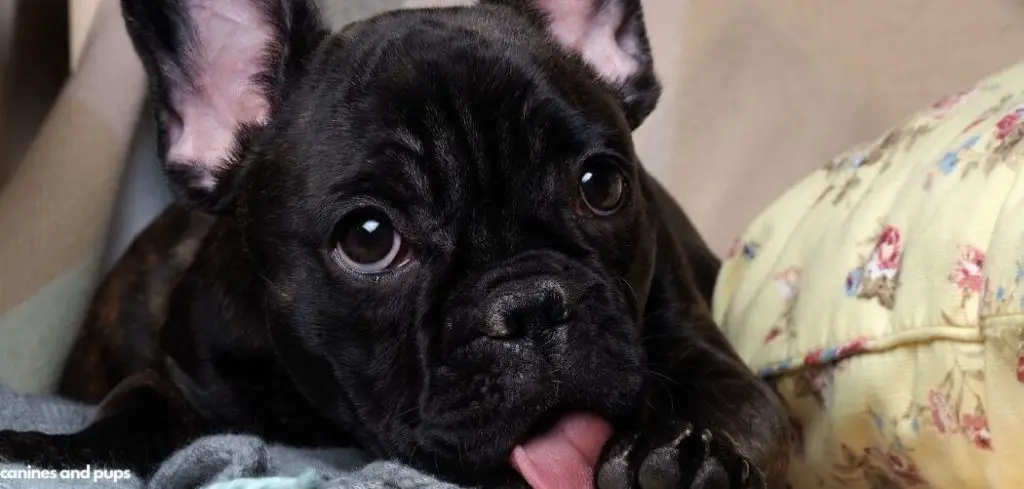It can be unsettling to notice a dog constantly licking its front paws at night. While some occasional grooming is normal, excessive licking focused on the paws, especially during nighttime, often signals discomfort or an underlying health concern.
We outline the common reasons why a dog may excessively lick its front paws at night, what you can do at home, and when to seek veterinary help.
Table of Contents
Dog Licking Front Paws Excessively at Night — Why It Happens
When a dog excessively licks its front paws at night, it usually points to irritation, discomfort, or anxiety. Allergies are among the most common culprits, leading to itchy paws that worsen at night. Pain from arthritis or injury can also drive nighttime licking.
Sometimes, parasites or skin infections are to blame, while in other cases, stress or boredom may trigger the habit.

Dog Licking Front Paws Excessively at Night: Common Causes
Allergies
Allergies are a leading cause of paw licking, particularly at night when a dog is less distracted by daily activity.
Environmental allergens like pollen, dust mites, or mold can settle on the paws and trigger itching. Food sensitivities may also contribute to chronic irritation.
Owners may notice redness, swelling, or even a yeasty odor between the toes. The nighttime pattern occurs because dogs often feel itchiness more when resting. If left unchecked, persistent licking can create secondary skin infections.
Read more: Dog Licking Front Paws Excessively (What it means and how to help)
Skin Infections
Bacterial or yeast infections often develop in the moist spaces between a dog’s toes. These infections cause itching, burning, and discomfort, which often peak at night. Dogs may lick obsessively in an attempt to soothe the sensation.
Signs include a foul odor, discharge, or crusty skin around the paw pads. Infections can quickly worsen with constant licking, leading to painful sores or open wounds.
Parasites
Parasites such as fleas, mites, or ticks can cause localized itching that drives nighttime licking.
Mites, particularly those that cause mange, are notorious for targeting the paws. Flea saliva can also spark allergic reactions, resulting in inflamed skin.
The discomfort tends to be most noticeable when dogs settle down to rest, leading to repeated licking episodes at night. Scratching, chewing, or hair loss in addition to paw licking may point toward parasites.
Pain or Arthritis
Dogs experiencing joint pain, arthritis, or even minor injuries may lick their front paws excessively at night. This behavior is often a self-soothing response to discomfort.
The front legs bear a significant portion of a dog’s weight, so arthritis in the wrists, elbows, or shoulders can make nighttime rest uncomfortable.
A dog with pain-related licking may also show stiffness, reluctance to move, or limping during the day. Unlike allergies, this type of licking is less about itchiness and more about relieving underlying pain.
Anxiety or Stress
For some dogs, nighttime paw licking is a behavioral issue rooted in anxiety or stress. When the house quiets down and distractions fade, an anxious dog may focus its nervous energy on repetitive behaviors like licking.
Separation anxiety, noise sensitivity, or even boredom can trigger this habit.
Unlike medical causes, stress-induced licking may not result in obvious redness or swelling right away. However, over time, the behavior can still lead to irritation and hair loss.
Dry Skin or Environmental Irritants
In colder months or dry climates, dogs can develop dry, itchy skin, especially on exposed areas like the paws.
Walking on salted sidewalks, rough terrain, or chemical-treated lawns can also irritate the paw pads.
At night, the dryness or irritation may feel worse, prompting dogs to lick excessively. Cracks, flaking, or redness on the paw pads may be visible in these cases.
Read more: Dog Licking Back Paws Excessively (Possible causes you should know)
What to Do If Your Dog Is Licking Its Front Paws Excessively at Night
If a dog is licking its front paws excessively at night, the first step is to gently examine the paws.
Look for redness, swelling, wounds, foreign objects, or signs of parasites. Keeping paws clean and dry can prevent worsening of irritation.
Wiping the paws after outdoor walks, especially during allergy seasons or in winter when salt is used, may reduce nighttime licking.
Soothing paw balms or veterinarian-approved sprays can also help relieve minor dryness or irritation.
Managing anxiety is equally important. Providing evening exercise, calming routines, or enrichment activities can help reduce stress-driven licking.
If allergies are suspected, consulting a veterinarian for allergy testing or dietary changes may be necessary.
Most importantly, try to prevent further self-injury by gently redirecting the behavior. Using a recovery collar or protective booties at night may provide short-term relief while addressing the root cause.
When to Call or Visit Your Vet
Veterinary care should be sought if paw licking becomes persistent, interferes with sleep, or results in open sores.
Signs such as limping, foul odor, swelling, or discharge indicate an infection that requires treatment.
If a dog shows signs of pain, such as stiffness or reluctance to bear weight, a veterinary exam is essential to rule out arthritis or injury.
Chronic or severe itching that doesn’t improve with basic care also warrants testing for allergies or parasites.
Behavioral causes like anxiety should not be overlooked either. A veterinarian can help determine if medication, supplements, or behavior modification may benefit the dog.
Read more: Dog licking paws excessively (When to worry)
Key Takeaway
Excessive nighttime paw licking is more than just a quirky habit — it is usually a sign of discomfort, irritation, or stress. While occasional grooming is normal, repetitive licking that disrupts rest should not be ignored.
By monitoring symptoms, providing soothing care at home, and knowing when to involve a veterinarian, owners can help their dogs find comfort and restful sleep again.
Paying attention to these signals not only protects paw health but also ensures a happier, healthier life for the dog.
